Online talk given in March2022
Abbas Milhem is the current Executive Director (since 2014) of the Palestinian Farmers’ Union, providing technical guidance and full supervision on project development and implementation processes for the 14 branches of the Union across the West Bank and Gaza Strip. Abbas previously worked with the Sudan Civil Society and Youth Participation (CSDY) Program as a Country Director for Sundan, the International Republican Institute (IRI) Sudan, Arab-Americare Foundation, Health, Development, Information, and Policy Institute (HDIP), Palestinian Center for Peace and Democracy (PCPD), and the Palestinian Child Cultural Center. Abbas has a Bachelor’s Degree in English Literature from Bethlehem University.
Abbas Milhem:
Thank you. Good afternoon, everybody and hi from Palestine. Hello. Today, I will make a presentation focusing on the very difficult situation of agriculture and water under Area C. And Area C is the area that is fully controlled by the Israeli area occupation. Before starting on that, I would like to give background information, by highlighting that in International Law and the General Assembly of the United Nations guarantee and affirm the right of Palestinians to sovereignty over their land and the use of their natural resources.
However, the Israeli occupation’s policies, especially the policy of Administrative and Military Divisions and the Policy of Settlements Expansion continue to threaten Palestinian existence and the lives of the population in all these areas, especially the Area C, which is rich in its natural resources and its fair trial agricultural areas, which is key for Palestinian economic development.
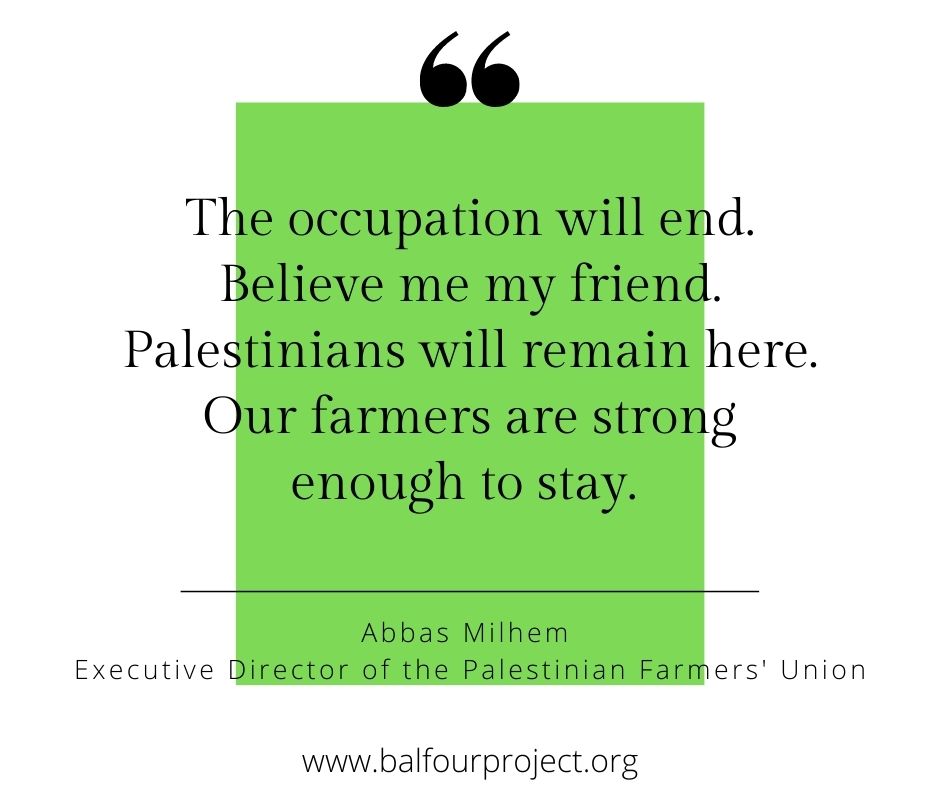
However, Israel controls all aspects of life and impedes any urban agriculture or economic development in those areas, leading towards the shrinkage of agriculture sector.
Historically, the agricultural sector in Palestine constituted a major component of the Palestinian economy, but due to the policies of the Israeli occupation, it took a sharp gradual decline. Where in the 70s, for example, agricultural sector constituted about 37% of Palestinian Gross Domestic Product, GDP. In 1994, it was around 13%. It was declined and the decline continue until 2019, reaching only to 7%. Now in 2021, we are talking about less than 4% where the agricultural contribute to the GDP. The reason for this is attributed to confiscation of the land, construction of settlements and the so-called outposts, water is scarcity and the construction of the apartheid wall.
Since occupying the West Bank in 1967, Israel has misappropriated more than two million dunams of lands, which equals 200,000 hectares throughout the West Bank area. Israel now, uses this land for its own purposes, including building new settlements, expanding the territorial control, including farmland and industrials zone and paving roads that mainly serve the Israeli settlers by repopulation.
It is worth noting that 91% of the agricultural land is located in the West Bank and the rest, 9% is in the Gaza Strip. 62% of this land in West Bank is located in Area C, which is controlled by the Israeli occupation. This area will decrease according to the Israeli Annexation Plan, which is considered catastrophic for the agriculture sector, as 34% of the area of the West Bank will be annexed by the Israeli government, which constitutes 411 square kilometers. In addition, it will include 425 Palestinian communities that mainly depend on agriculture.
Now this is not the only catastrophe Palestinians are facing in terms of shrinking of agriculture and shrinking of land and annexation of land, but also there’s annexation of water resources and control over water resources. Since the Israeli occupation of the Palestinian territories in 1967, the occupation authorities have controlled the surface and the ground water resources.
The Oslo Accord states in its Annex 3 in Clause Number One of the agreement, “The need for cooperation in the field of water and its development by experts from both sides, including proposals for studies and plans on water rights for each party, as well as the equitable use of shared water resources, during and after the transitional period of the Oslo Agreement.” In the second Oslo Agreement, in order to get Palestinian their water rights, as the occupation government recognises the Palestinian water rights in the West Bank, according to that agreement, where these rights are to be discussed in the final negotiations and will be established in the permanent agreement relating to the various water resource.
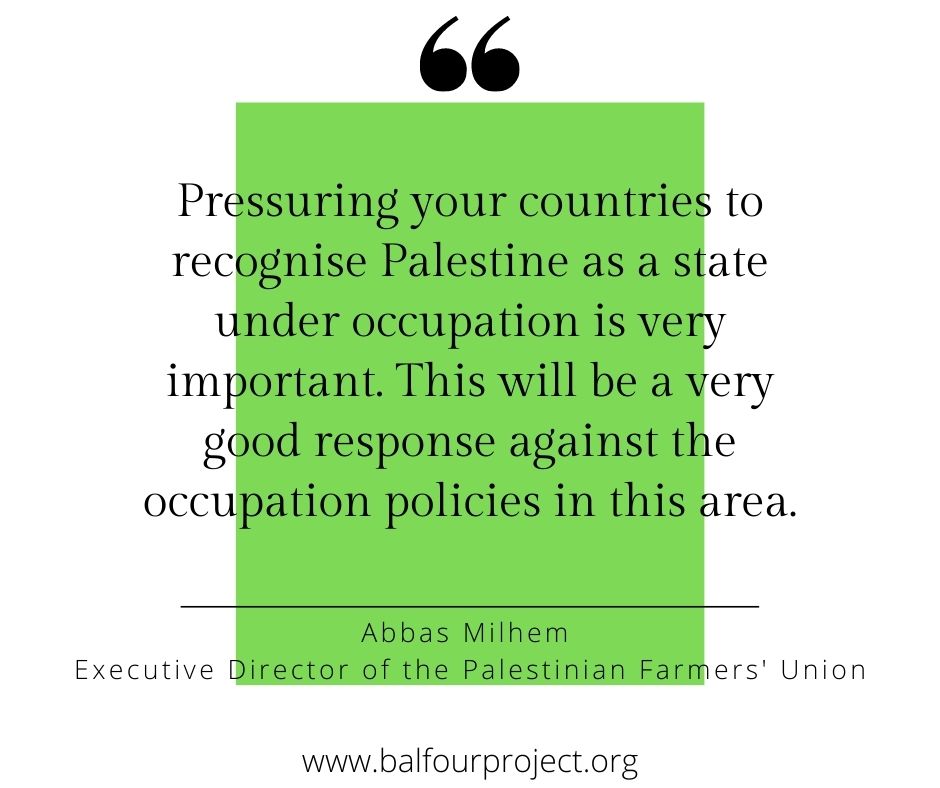
And in that agreement, it states that, and I’m quoting here, “Israel recognises the rights of Palestinian to water in the West Bank, and the Israeli side recognises that the real needs of Palestinian people for water for domestic purposes are from 70 to 80 million cubic meters annually, and increasing water quota allocated to Palestinians during the transitional period up to 26.6 million cubic meter every year, annually.”
But the solution for the water problem, unfortunately has remained and postponed to the final status of negotiations. What’s happening now, that agreement and what was stipulated in the Oslo Agreement was never implemented on the ground. Israel now has the full control over the water and the land resources in Palestine. Most of the resources required for agriculture and farming practices in Palestine are located in Area C. However, access to land and water in Area C is completely restricted by the Israeli occupation for the benefit of settlers.
The aim of this control is to evacuate land from farmers and leave land easy hung for confiscation and annexation. It’s important to know that it is impossible for Palestinian economy to recover without developing Area C and providing Palestinians with full access to the Jordan River and the Dead Sea, as Palestine is deprived of 265 million cubic meters of water from Jordan River and 40 kilometers from the shores of the Dead Sea.
According to the World Bank Study, although it was all since 2014, Israeli companies earn about $3 billion annually from selling deep sea minerals and other products derived from Dead Sea mineral productions.
The continued control of Israeli occupation over Palestinian resources has catastrophic effects on the Palestinian economy. First, a report prepared by UNCTD, United Nations Conference on Trade and Development, reveal that the cost of Israeli occupation to the Palestinian people between 2000 and 2017 is estimated at $47.7 billion. Look how huge the loss in the economy due to the occupation of Area C and the national resources there, which is three times the size of the National Economy for 2017.
And according to the UNCTD report, submitted to the United Nation General Assembly, they say in that report of the World Bank, losses are still rising. In 2021, the losses reached up to $50 billion as economic losses due to the occupation and the occupying of our resources.
The complete control of the occupation over water resources, confiscation of agricultural lands and obstruction of farmers access to their lands to cultivate or graze had a direct negative impact on agriculture. This has prompted Palestinian to stop working in agriculture, unfortunately. The lack of water, especially through water networks lead to the purchase of water using tanks or purchasing water from Israel, leading to a rise in the cost of living and in the cost of agricultural production. So that agricultural production became non-competitive with the Israeli products through the support provided by the Israeli occupation to settlers, especially in water and agricultural products.
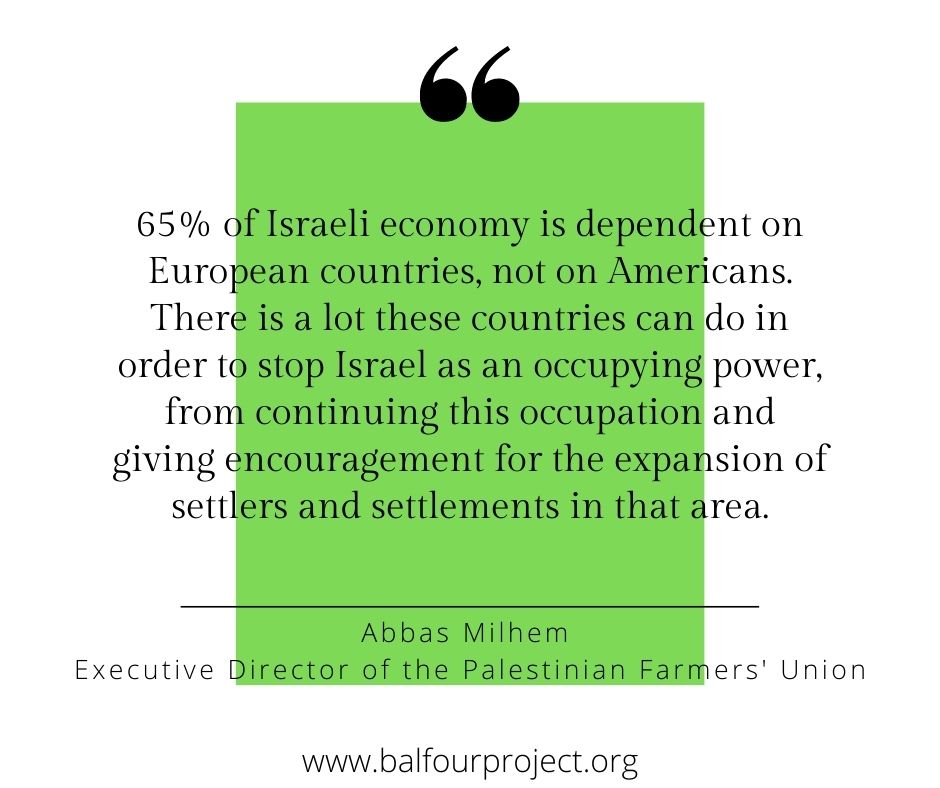
Area C is considered key to Palestinian economic development, and because of Palestinian inability to access Area C, the gross domestic product loses 2.2 billion annually. And the revenue on the treasury of the national budget was reported as a loss of $918 million annually.
Diana:
Sorry Abbas, I’m just sharing a map of Area C, because some people have requested it.
Abbas:
Yes, yes. The red parts are Area C, by the way. For those who are seeing the map, all these areas are Area C and you can imagine and see how large is Area C. Leaving the Palestinian community, the white areas, Area A and B, the white areas as small cantons, small islands disconnected from each other, and like swimming in a sea of Area C under of the full control of the Israelis. So there is no possibility for any viable Palestinian state to be established without having control on Area C. Area C is the storage, the historical, the strategic storage for food security, for agriculture and for natural resources.
So just another thing to add about Area C is that Area C and the Jordan Valley contain more than 90% of the Palestinian natural resources and wealth, but the greed of the occupation to exploit these resources deprived Palestinians from their own natural resources. This what the World Bank said in the study that was published in 2014.
Having said so, this shows that an annexation is really happening on the ground, although you have maybe heard the Israeli government announcing that they will postpone an annexation. What happened actually is that, the occupation postponed an official announcement of annexation while on the ground, the annexation is happening. This annexation is accompanied with increasing settler violence and attacks against Palestinian farmers. The settler violence, by the way, has been increasingly intensified over the past three years.
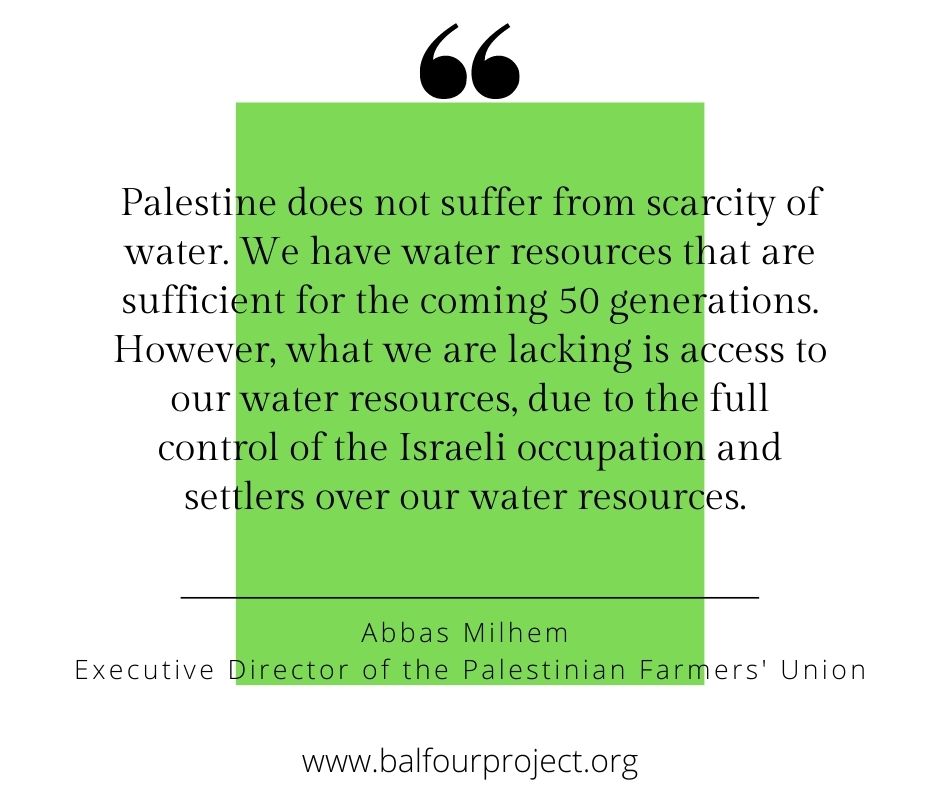
The situation in settlements expansion will lead to the seizure of Palestinian citizen properties, violation of their rights, escalation of settler violence. In September 2021 only, in one month, settlers killed three Palestinians, injured 127 Palestinians, uprooted more than 8,000 trees and property and cars were vandalised. In addition to 774 residential and economic facilities that were destroyed, 184 of which were funded by donors. In addition to 959 Palestinian citizens who were displaced and prevented from returning to their homes in Toubas Area. And here, I’m talking about Humsa al-Baqai’ Area in Toubas Area. All of this is considered as a violation of international laws and the Fourth Geneva Convention. This is according to OCHA.
The question here, ladies and gentlemen, what should be done? I mean, this is catastrophic. This is really catastrophic. Settler violence, protected by the Israeli Army are attacking Palestinian farmers on daily basis in their farmland, taking them out of their grazing areas, preventing them from entering their farmlands or cultivating their lands, denying their right to access to their land and natural resources. And all of which is aiming at emptying the farmlands from farmers in order for the Israeli settlers to annex, confiscate, and make full control of that land.
All this happen unfortunately, and the whole world is watching. What they’re doing, unfortunately here, is they issue a letter of condemnation or a letter of concern. And to be frank with you, Israel as an occupying power, have coped with these letter of concerns, letter of condemnation from the international community. And if you go and visit the Ministry of Foreign Affairs in Israel and you’ll look at the archive, you will find piles of letter of concerns and piles of letter of contamination against settlement expansion, annexation plans, and the violations against Palestinians, but Israel, have coped with that, doing nothing. And there is no price Israeli occupation is paying for being occupiers, and settlers have never been hold accountable by the international community in order to stop them of being settlers. Actually the silent policy or this policy of just concern and condemnation, it indirectly encouraged the settlers to expand and to continue controlling the Palestinian farmlands and agricultural areas in Area C.
I think this is the time to stop talking, but start doing. The international community need to shift from the level of condemnation, to the level of taking actions against Israeli occupation. Without holding Israel accountable, and without having settlers paying the price of being settlers, the violence against Palestinians will continue. Israel have succeeded to establish an apartheid system in Palestine, exactly like what Amnesty International Report for this year had described Israel as a country of apartheid. This is an apartheid regime, worse than the whole world witnessed in South Africa. And that apartheid regime in South Africa was only toppled down by solidarity, boycott and actions against the apartheid regime in that area. And I think without taking actions and holding occupation accountable, this apartheid regime will continue and the suffering of Palestinians will continue.
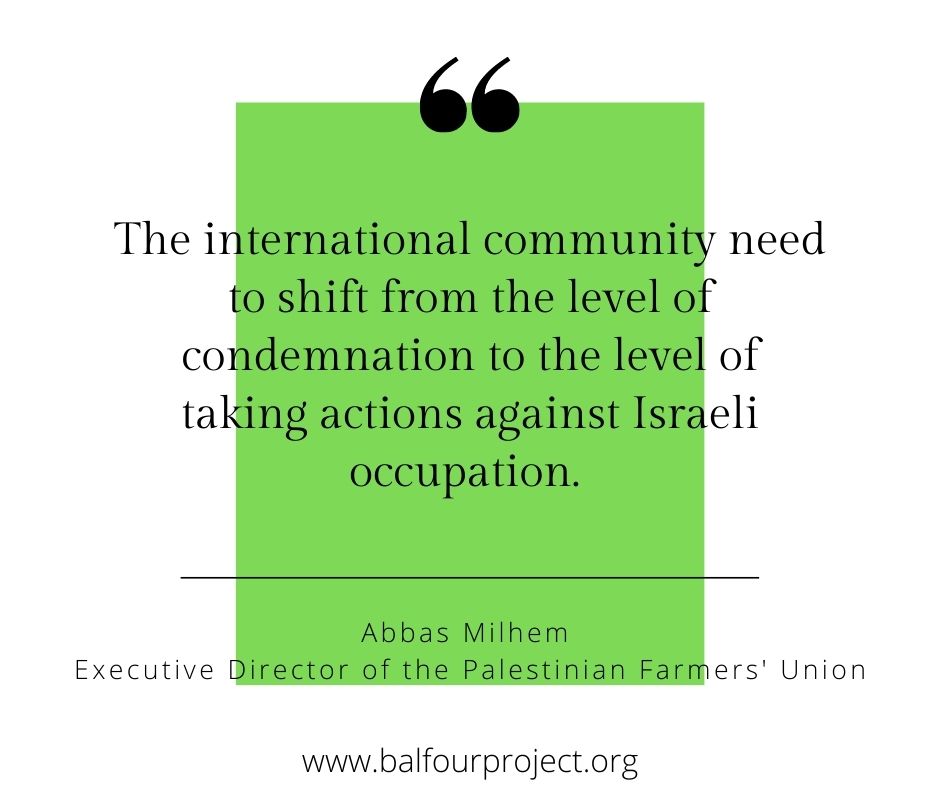
I tried to be brief with all these information being intensive like this, to leave a wider window and to give you an opportunity for any questions and answers. Thanks for being patient following my presentation.
Diana:
Thank you so much for that. Some of your figures that you gave us, the decrease from what I understood, it was more than 30% down to less than 4%, that agricultural industry?
Abbas:
Yeah, from 37% to less than 4%.
Diana:
It’s heartbreaking, isn’t it? And the fact that people are choosing to avoid that industry now, because it’s just too difficult. We’ve got a really good question that’s come in from Kirsten Dalberg, “Do you have any facts about climate change effects on Palestinian agriculture?”
Abbas:
Climate change issue here in Palestine is a big issue where Palestinians are paying the price of those who destroying and causing the climate change negative impacts. All these chemical factories in Israel for example, that are established on the border of the West Bank, like the ones in Tulkarem, Dishouri and … Those chemical, two chemical factories, although the court have decided that these factories are poisonous and they’re killing, but they’re still established there. And the decision of that court stated that the negative impact of these factories are only hurting Palestinians, but not Israelis from the West Side of these factories. That’s why they keep these factories there.
Anyways, due to the control of Israeli on water resources and the climate change, and the implication of the climate change on the water scarcity had made it difficult for Palestinians to get water to irrigate their agricultural projects.
We have water scarcity, because water is under the control of the Israeli occupation. Adding to that, there is drought that is expanding, this water, annual water rain from winter due to climate change, and this affecting the Palestinians from getting sufficient water, not only for irrigation, but even for drinking. So adaptability techniques are really challenging for Palestinians to encounter these severe and difficult and hard implications of climate change.
What we try to do? Yes, we’re trying to make some models in order to adapt and to make our farmers adapt with the climate change implications, like using some smart agriculture techniques that will minimise depending on water for irrigation, and that would increase the profitability and productivity without the use of chemicals. Of course, this is challenging. As long as we’re having the occupation there and the water is controlled completely by them, we will continue to suffer and having no water to irrigate our agriculture production.
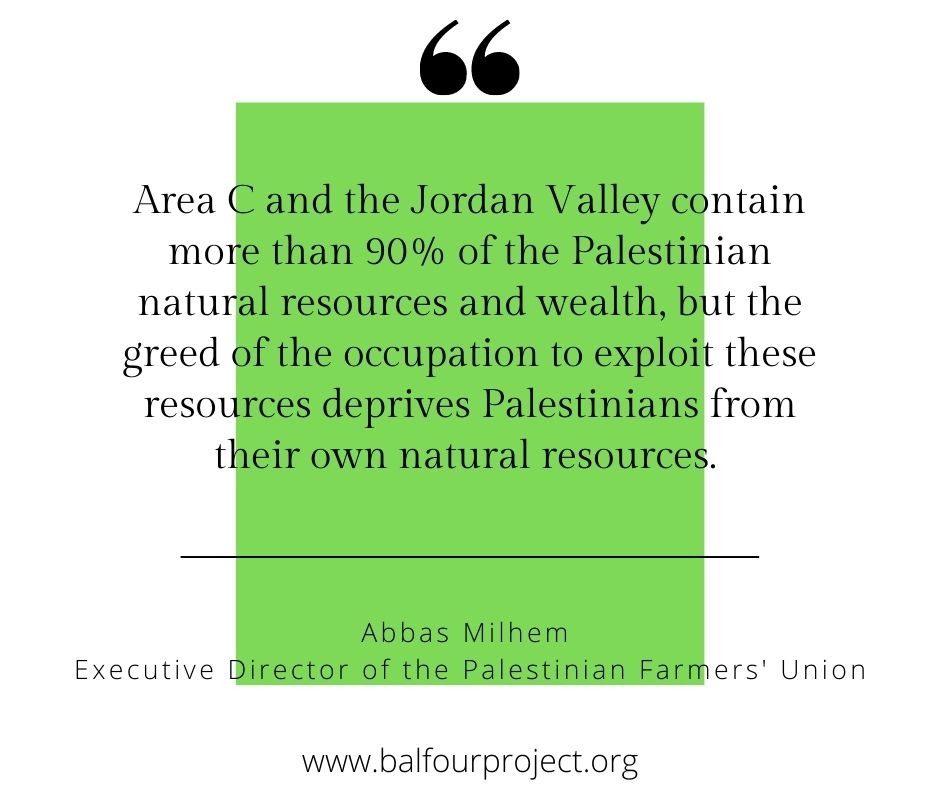
Diana:
We’ve got a couple of questions about olives and olive growing. “Off the less than 4% GDP that is now coming from agriculture, how much of that is from olive growing?” That’s a question from Jane McLowan. And from Johanna Alberti, “What is the impact of climate change on agriculture in the West Bank, particularly of olive growing?”
Abbas:
As a matter of fact, the olive sector in Palestine is the largest agricultural sector in Palestine. More than 110,000 families are living entirely or partially on olive oil production and olive produce. The annual revenue of the olive sector in Palestine exceeds $100 million a year.
Not only that. The olive tree in Palestine is not just a tree that would have economic revenue. It’s symbolic for life, symbolic for hope, symbolic for peace, symbolic for source of income, symbolic for everything. It’s a strategic patriotic tree, that people look at it with holy approach, not only as any other tree. It’s a tree where they feel that their identity is there, that their life is there, that symbolises their being Palestinians is in that tree. You know, we have trees in Palestine that are 5,000 years old, like the one in the Bethlehem area. It’s the oldest olive tree in the whole universe, at least known in the modern, in the whole universe until now.
So people, they deal with the olive tree exactly like what they deal with their children. That’s why when Israel approach one tree, they feel they’re uprooting or killing one of their daughters or sons.
It’s very important. And the climate change here is very catastrophic, because for the past two years unfortunately, usually during February and March months, these are very crucial months for olive sector. If we have very good weather during these two months and very good climate to allow olive trees to give fruits. When we are in bad shape for the past two years and due to the climate change, in February and on March, we didn’t have the appropriate climate for an environment for the fruits of olive season. And the fears now among all farmers and us as a union, caring about small scale farmers is that, if this continue for the coming two to three years, Palestine might not be suitable for olive trees, unfortunately. And that will be big catastrophes because the majority revenue of our GDP in agriculture is coming from olive sector. Thank you.
Diana:
Thanks for that. There are two questions on the same theme. One from Sir Vincent Fean, who’s the chair of the Balfour Project. He says, “Thank you Abbas for your precise and shocking present. Agriculture is indeed vital to the Palestinian economy, both in Gaza and the West Bank. Is it correct that Israel currently has more water than it needs and that it could afford to share water more equitably?” And then from Donald Saunders, he says, “I understand there’s almost limitless availability, even for swimming pools in the illegal settlement. How do Palestinians feel about this?”
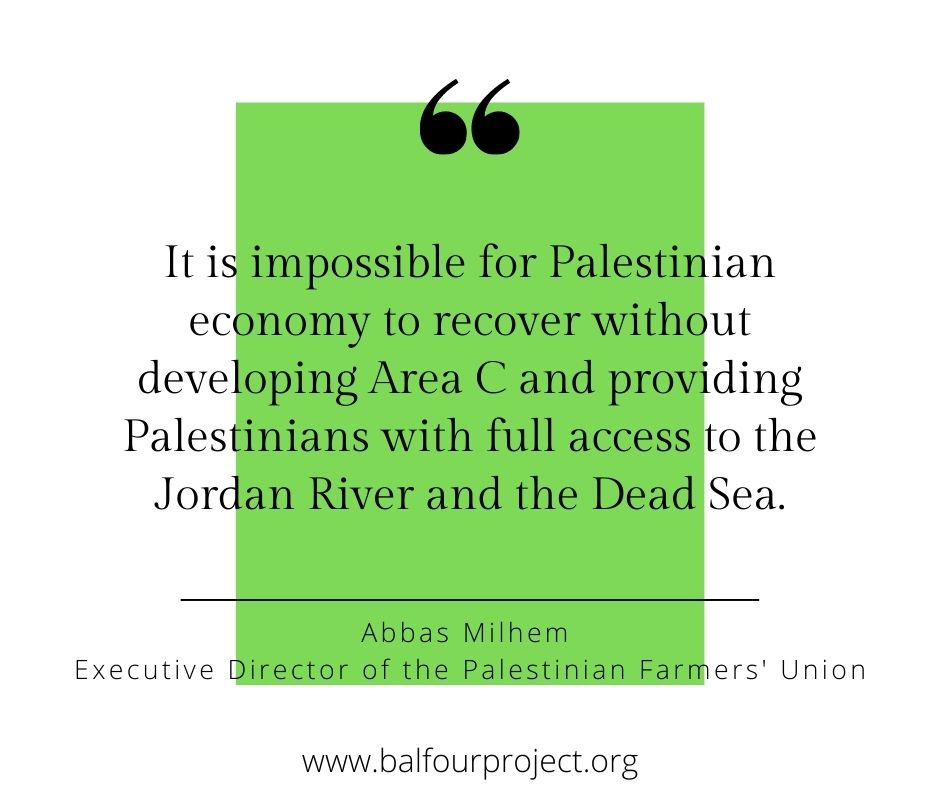
Abbas:
Let me say the following regarding water resources. Palestine do not suffer from scarcity of water. We have sufficient water resources that are sufficient for the coming 50 generations. Not only one or two generations, even for the coming 50 generations and these are scientific estimations. However, what we are lacking is access to our water resources, due to the full control of the Israeli occupation and settlers over our water resources. That’s why Israel is having more than they need in terms of water, because they’re using our water resources for their drinking and irrigation purposes inside Israel.
Most of their water inside Israel is coming from the water resources pumped from Jordan Valley, in the Eastern part of West Bank.
So yes, they do have more than they need. That’s why, for example, if you go and see a settlement in the Jordan Valley with a Palestinian livestock farmer neighborhood next to that one, you can see the difference. Greenness, water available 24 hours in the settlements, swimming pools, washing cars, washing streets. And even in summertime, they wash trees because of the more than they need water. While on the other side, just few meters far from that settlement, Al-Hadidiyeh neighbourhood, a livestock farmer community in the Jordan Valley, they don’t have water for irrigation. They don’t have water for their animals. They don’t have even water for drinking purposes. Although the transitional pipeline of water that transport water to that settlement is going through Al-Hadidiyeh neighbourhood community. But the people there, the Palestinians, are denied the right to use that pipeline for drinking or irrigation or for their animal, but settlers, they have it 24 hours.
Adding to that, the cost of water. Settlers use is covered by the Israeli government, and it is perceived as an incentive for settlers in order to stay as settlers in the Jordan Valley and this is like an allowance for them to get, because they pay no cost for water.
Second part of the question. What Palestinians feel, I mean you can imagine. You can imagine looking at the water being wasted here and there. They wash their cars every day. They wash their streets every day. They have swimming pools and everything. While people on the other side, they are starving for a drop of water for their drinking or for their animals. And to compensate that, they are forced to buy water in tanks, which is like 30 shekels per one cubic meter. 30 shekels is almost $10. Almost $10 per one cubic meter, while settlers there, they consume water at no cost.
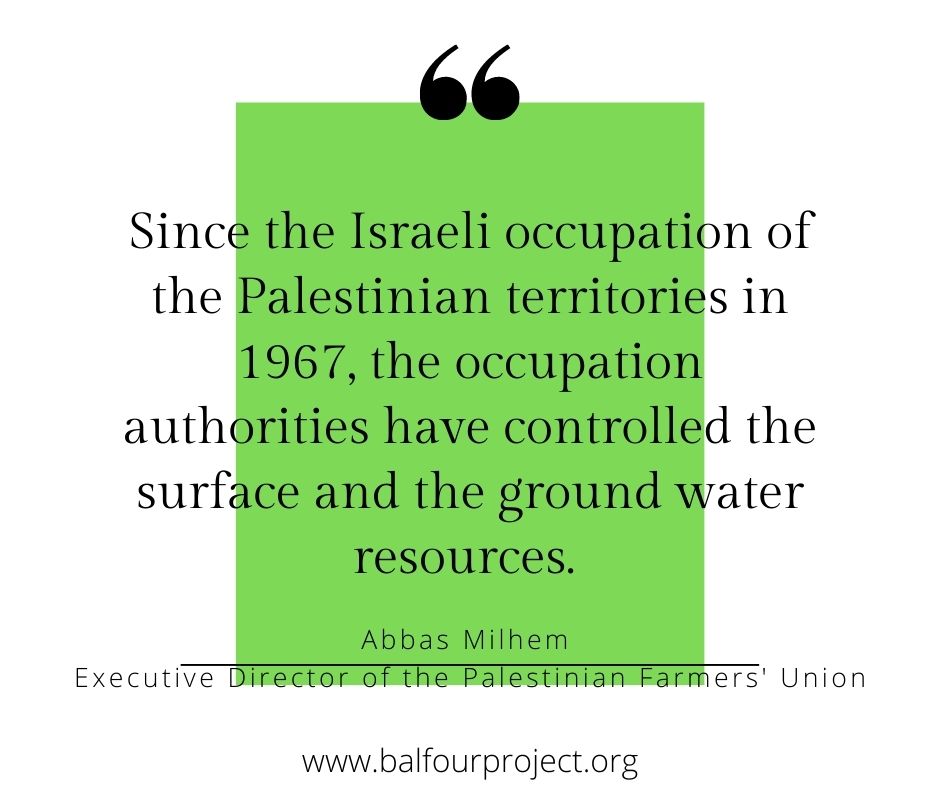
It’s catastrophic.
Diana:
It’s shocking, isn’t it? We’ve got a question from Maggie Foyer, “Is the large scale planting of grapes in the settlements making a significant impact on water usage?”
Abbas:
Not only grapes, they have dates also. Dates in Jericho, starting from Jericho to northern slopes of the Jordan Valley. You have huge palm farms there, they produce dates. And these dates, they require huge amounts of water for irrigation. Adding to that, the grapes. Grapes, dates, watermelon, different agriculture production. Since water is available and at no cost, of course you can produce everything in the Jordan Valley. It’s the most fertile soil. What will you cultivate there, you can get fruits out of. And since water is the highest and the most important resource you need for farming and cultivation and it is available for free, of course they produce everything.
Commercially, they are competitive. So when they sell their produce, even outside the country, outside Israel, the prices are competitive. Because they receive incentives from the Israeli occupation. By the way, most of settlers in West Bank are living there for business, because of the tax exemption they get from their government, incentive package they receive, they have tax refund on any purchase they do. Second, they have what they call, Support for Resilience. Can you imagine that settlers occupying lands of others, they receive support of resilience for them to continue being settlers in that area? 20% of their purchase is being paid back to them in a form of support of resilience, in order to continue living there as settlers. That is encouraging settlement expansion.
Diana:
When the settlements are deemed illegal by the international community, that’s just shocking. I am going to ask another question from Kirsten because it’s a really good one. “Desalination, is that a way to solve the problem until the occupation is stopped?”
Abbas:
Ah, from where? We have no sea. We have no rivers. We have no access to any kind of desalination. Israel is doing desalination and they’re using these for their own users, but we don’t have. Even in Gaza, Gaza is expected in 2030 to be an area that is not suitable for a human being to live there, because of no water. Although they have a sea, but they are unable to do these projects there, because any equipment that need to go to Gaza has to get prior approval from the Israeli side. And Israel is using anything to squeeze in Gaza people and not to allow any access of goods, except for some products that are coming from Israel. But apart from that, they do not allow free movement of goods and production in and outside Gaza.
And we don’t have access to the sea in Gaza, as West Bankers. And all water, sea water and desalination projects, that would be big projects run by the Israeli government and for the benefit of the citizens and settlers. We don’t benefit from that.
But why to rely on such issue? Why are we looking for alternative of solutions, if we have the solutions there? We have water, it is available there. We have water resources in our lands, but the water resource itself is controlled by the Israeli occupation. All what we need is to allow in access of Palestinians on their own natural resource. I’m not talking about natural resources that are in Israel. I’m talking about natural water resources that are in the Jordan Valley, owned by Palestinians in their farmlands and should benefit them, but we will not. We’re having no right to get access to these natural resources.
Diana:
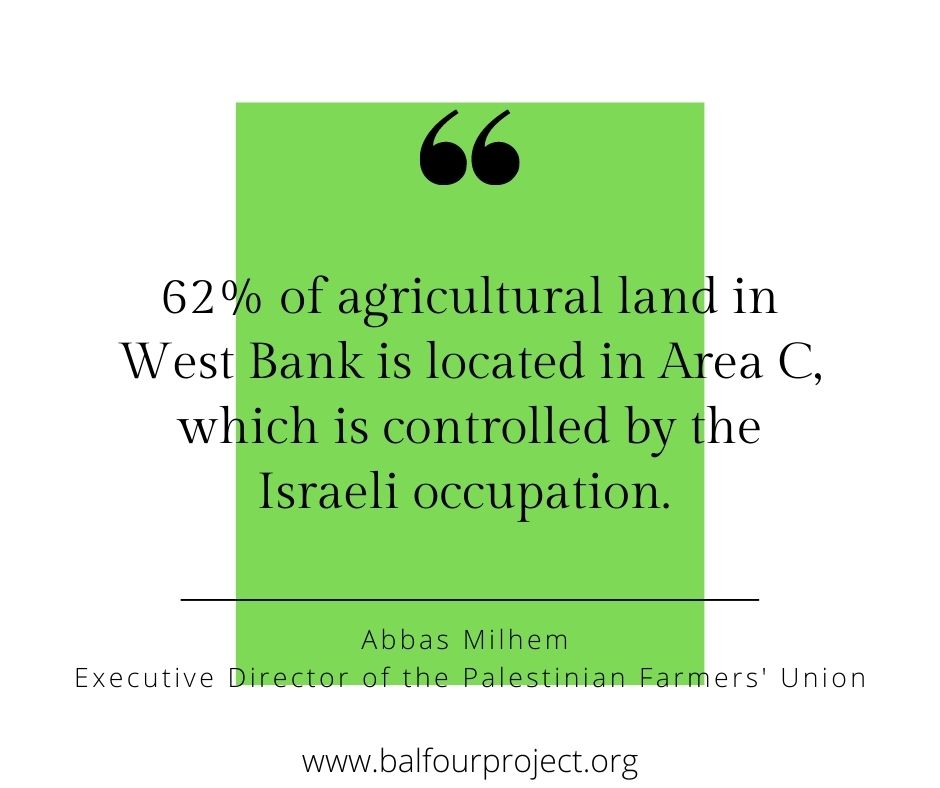
Thank you for that. This is a question that maybe you can answer. From Nigel Walker, “How can I identify horticultural or agricultural produce exported from Israel that are produced on confiscated land or the illegal settlements?”
Abbas:
This is a very good question and we have in PFU, I personally participated or did three lobby tours in Europe, including UK by the way, including London. I was in London in 2019, just few months before COVID-19 was outbroken. And there, I met with the House of Common, Parliamentary members and even with the Foreign Ministry, and I met with some solidarity movements.
They’re talking about how we can hold the settlers accountable by boycotting to purchase from their produce. And we tried to pressure European countries to label settler produce coming from settlements. But let me tell you something, any dates in the market, there are no dates produced in Israel. All dates, 92% of the Medjool dates in Israel is coming from settlements.
So it’s like a brand, even if they change the logo, if they write in Arabic, if they say, Produced in Israel, it’s all from settlements. And second, I think now the European countries, according to the European Court, this is the General European Court, they started to label the produce coming from Israeli settlements. And your country can ask Israel to put the label on where that produce is coming from. And believe me, you don’t need only to label the produce if it is coming from settlements or not. We need to prevent that produce from entering in European markets and UK markets, because of your principles and laws. You say that you are with human rights, against occupation and with sovereignty of people being under occupation and so on, but what’s happening in Ukraine now?
People are showing solidarity with Ukrainians, saying that this is against the Russian occupation. The same is happening here. We have an occupation and we are living under occupation. Our land, our produce, our life, our resources are all controlled and confiscated by occupation, and solidarity should not only be by words. It should be also by actions.
Diana:
It’s always been a conundrum to me, how something can be deemed illegal, the settlements, yet we can still trade with them. It’s baffling. You mentioned the Ukraine. So Farzana Saker says, “It’s great to see the support given to the Ukraine by our government and other countries around the world. It has also highlighted that the UK government think Palestinians don’t deserve to be treated with respect, equality and justice. Where is the outcry for the Palestinians like we have for the Ukraine?”
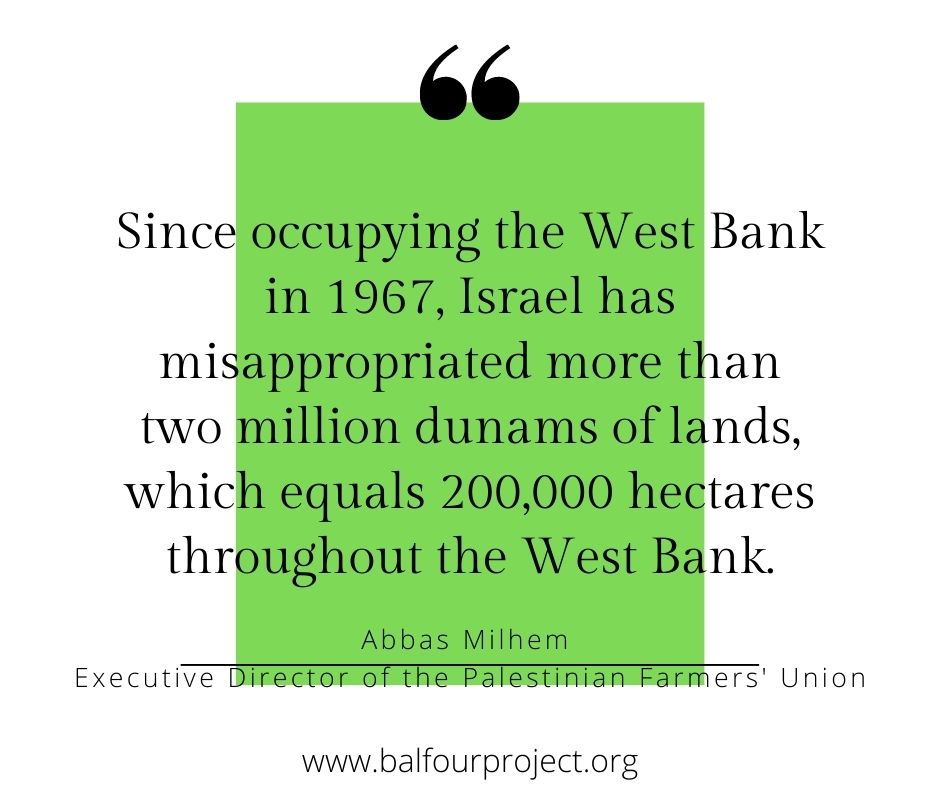
Abbas:
Double standards.
Diana:
We’ve got Jane Scriven saying, ” Zaytoun dates and other produce is from Palestinian farmers.” And we’ve actually got Heather Masoud from Zaytoun joining us today. So for sure, if you want to find Palestinian produce, check out Zaytoun. They’re in a lot of Oxfam shops. They’ve got website themselves. We’re big fans of Zaytoun.
Abbas:
And if you don’t find, ask us in PFU and we’ll secure olive oil for you in London, don’t worry, or whatever you will.
Diana:
It is possible to find Palestinian produce. You might have to do a little bit of digging, but it’s worth it.
Abbas:
You have Jaffa Limited Company in UK that market agriculture produce from Palestine only, including olive oil. You have Canaan, you have Al Ard also. All of these, they work on processing of olive oil production, and they market in UK and in other European countries as well.
Diana:
Fantastic. So we’ve got a question from Penny Wilcox, “In the village of Zannouta, in the South Hebron Hills in 2018, villagers told me of pollution from activities in the nearby industrial zone. This affects the fertility of the land and also caused the spike in cancer cases. I believe there’s evidence of Israel moving hazardous industries from Israel into the West Bank, from Israeli cities, as it’s less regulated in the West Bank.” Do you have any comments on that?
Abbas:
Yes, yes, yes. That’s why, we said almost 60% of Palestinian land is classified as Area C. It’s the largest area in Palestine. And given that this area is under the full control of the Israelis, they use it in different ways. One thing they’re using that land for is they use it as the garbage of their chemical waste. Like for example, he mentioned south parts of Hebron. I can tell you about Idna, one of the well known towns in Hebron Area called Idna. There’s a big garbage area where Israel throw all chemical waste and chemical garbage in that area. The cancer ratio in Idna has been recorded as the highest in the entire region, due to chemical waste and the chemical garbage from the Israeli area side, that usually they bury in the Palestinian land area.
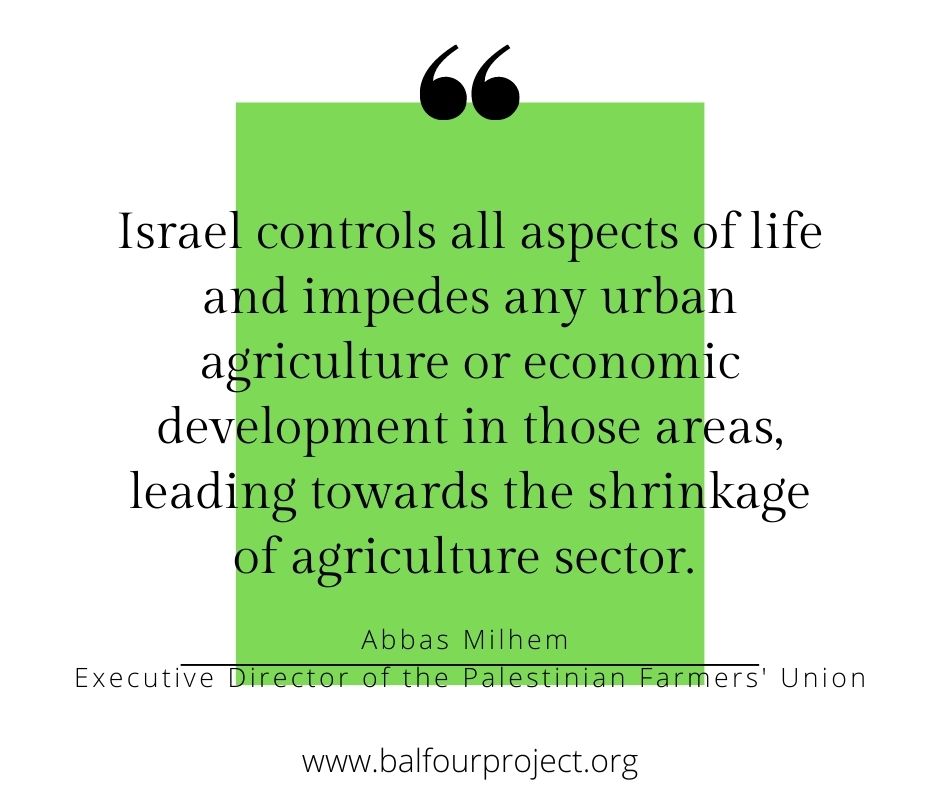
Of course, second, excessive use of chemicals for agriculture and waste of chemicals they throw in different parts of Area C. They polluted their land and polluted the air and even poisoned their people who are using and smelling that thing. Yes, this is correct and it’s happening.
By the way, we have a research on that, Chemical Use in Palestine. We can share it with you, if you like. And we would use a documentary feed you called, Poisoned Soil, due to the chemical waste and use of the areas and the garbage they throw in the Jordan Valley area, where the area became poisoned because of these chemical waste and chemical use from the Israeli side in settlements and in other areas.
Diana:
Thank you, that’d great. Any useful links like that, I will include on the page where we will put your recording and your transcript. I just had a comment from Vincent Fean again. Sir Vincent Fean, our chair who says, “The Balfour Project agrees entirely with you, that the settlement products should not be permitted to be imported into the UK or the European Union. Settlements are illegal, so what they produce is illegal. Last May, the Balfour Project held a conference on the Rule of Law in Israel and Palestine.” We produced by the way, a booklet on that with the summary of the transcripts of the different talks by some very amazing speakers. So please do get in touch, if you would like a copy of that. “And issued a statement calling for recognition of the State of Palestine and a ban on import of settlement products. We will keep calling for this, as the Balfour Project.”
Abbas:
Yeah. Thanks for that. Thanks for the efforts everyone is doing in order to prevent and stop and holding settlers accountable by making them pay the price of being settlers, and by not buying their produce and even not allowing their produce to enter the markets in UK and different countries.
Diana:
I’ve got a question from Ron Mendel. He asks, “How are Palestinians defending their farms, their produce and their livestock from systematic restrictions imposed by the Israeli government, but also settler violence?”
Abbas:
It is not easy and here I want to be frank. It’s not easy. You know, the attacks against Palestinian farmers by settlers on daily basis, violations, injuring them, destroying their projects. And financial capacity of our Palestinian farmers is very small. They can’t hold all this. Of course, we as a union work hard to pressure our government to respond immediately to these farmers’ need in order to bring them back to track of production, rather than shifting them to be relief recipients. And we, as a union, we try to provide support of resilience for farmers immediately when they have the projects being destroyed or demolished or whatever, by the Israeli side. Of course, we don’t have that big financial capacity, but at least we can provide the minimum and we recruit other resources from donors and agencies, from supporters who can do something to support the minimum requirement of farmers in the Jordan Valley, in order to support the resilience to stay in their farmland.
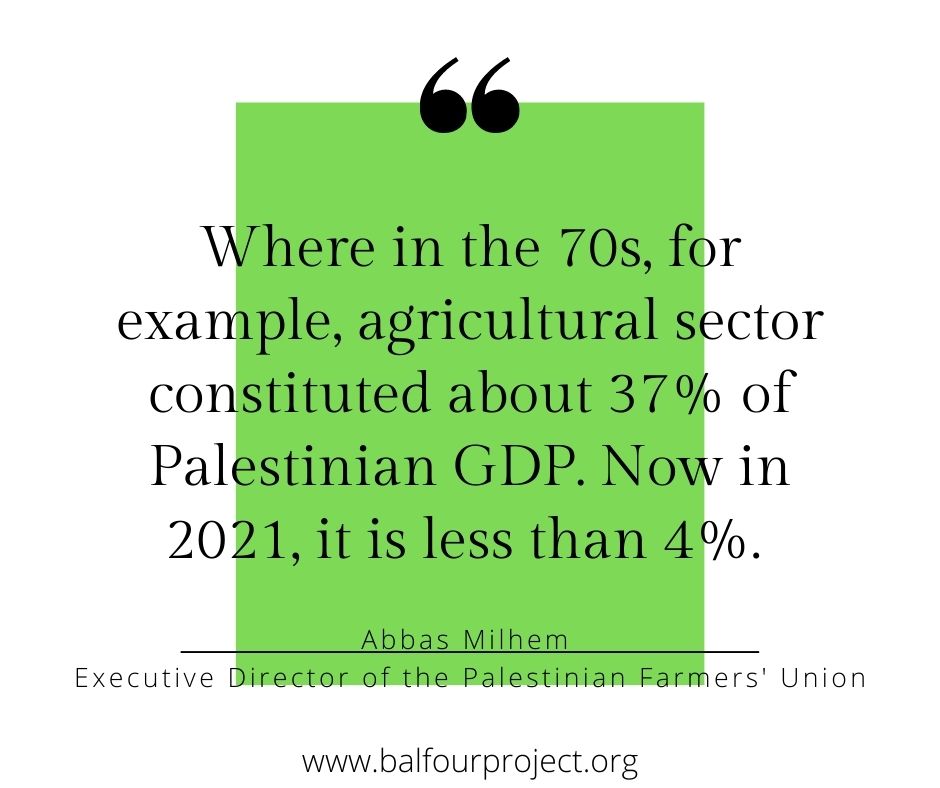
This doesn’t mean that we succeeded to provide all what is needed, because now many farmers unfortunately, who were forced to leave and they left their farmland and they became workers unfortunately, working inside Israel because they lost their source of income, due to these ongoing violations and ongoing destruction, ongoing demolishing of their projects.
So yes, there are many people, unfortunately, who could not hold on, but despite that, farmers in the Jordan Valley and in areas here are still resisting. I know they are paying from their blood to stay in their land, but they feel and they believe and we are with them in this belief, that they are paying a holy price for a holy issue, and they will continue to resist there. And this is the only option left for them, is to resist and defend their lives and their existence in their own properties in the Area C.
There are challenges, yes. They are paying the price. On daily basis, they’re paying the price, but there is no other alternative, no other option, except to continue. And they will continue there and we are with them on daily basis. We are there. That’s why we prepare this presentation and tell the whole world what’s happening to our farmers there. Because these farms is very important for them to feel that they are not abandoned, that there are people in this world who care about this situation. And how these people in this world would know? Like the efforts you are doing Diana, in these webinars and the talk we are doing here, and those people who are caring to listen to understand the situation and the context.
I’m sure those who are listening to us now will not stop after they know these pieces of information. For sure, they either will share this information with others. They may do something, they may resist against something. Even if it is a small action, but small things, believe me, can make big differences. And for people, our people there, at least when they know that there are people who care about them, even in UK or in European countries, but still they care about what they’re suffering. This will give them an incentive of continue being there and resisting. Despite all these difficult and catastrophic situation, our farmers are still there, with all the challenges and the prices they are paying. And believe me, we will continue to be there.
That land belongs to us and we will continue to be there.
Diana:
I think, I speak for most of us attending that, please do pass on the message that we are thinking about them and we do care. We actually have a lot of people who are attending, who have been to the region as you’ve seen from some of the comments and questions. So we’ve got a question from Amelia Mills, “Having been to the Jordan Valley, Bardala Village, on a community center construction with internationals.” And she helped with the olive harvesting near Nablus a couple of years ago. She witnessed the reality that the farmers face out there. “If the farmers cannot access their own land, is the soil being depleted? And how can fertility be improved?”
Abbas:
You know, usually in this vulnerable area and most of these areas under a fret in Area C, very close to settlements or in the apartheid wall area, isolated by the apartheid wall, usually for example, harvesting of olive season happen with large number of people. And even with solidarity groups and international people interested to help Palestinians, collect and harvest this, their produce during olive sector. And this really can provide a level of protection for Palestinians when they are accompanied with foreigners, and this happened many times.
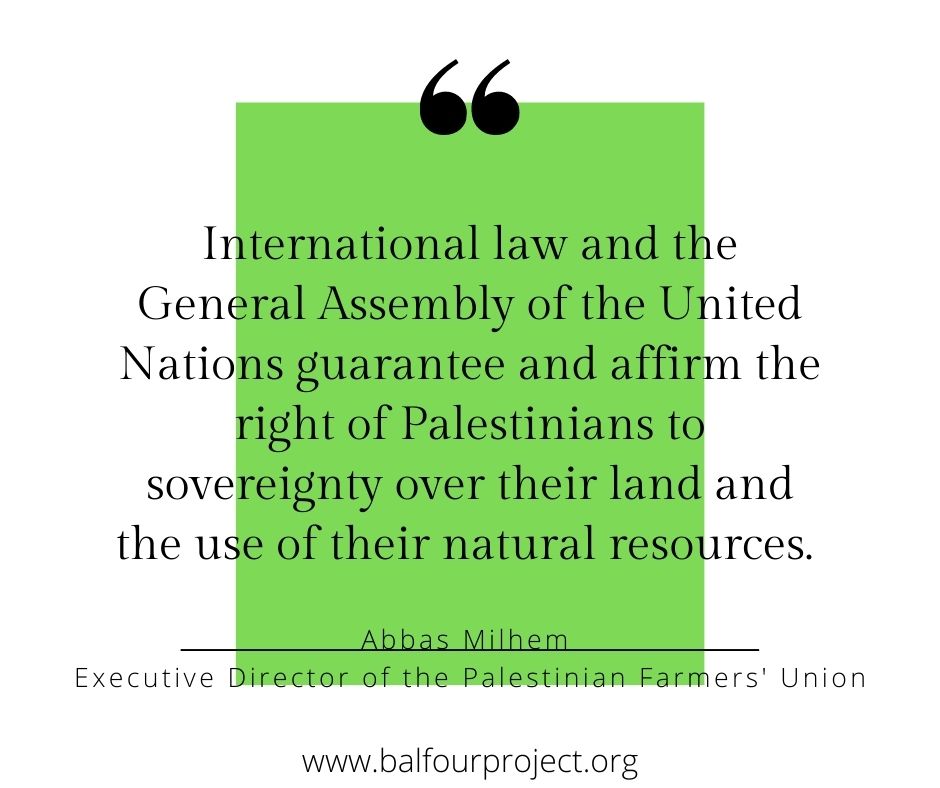
Every year, we have a campaign called, You Are Not Alone, which is for our olive farmers of our sector, implemented not only by the Union. The Union and other organisations in Palestine who recruit volunteers in large numbers to go and help Palestinian families to harvest their produce during the olive season and who also have these lands very close to settlements and they might be under the risk of being attacked by settlers. Despite that, many attacks happen, even during this large presence of internationals and volunteers, helping Palestinian families. Some were injured by the way.
But as I told you, the farmers are there and they are connected to their land. Their souls are there and they will continue to be there, despite of the price they are paying. They have no other alternative, but to live in their own land, as one of them said, “Either we live above the land or inside the land.” I mean, either we are buried in this land as killed due to violations or attacks, or we live in dignity above this land. This is our land. We’re not going to leave.
Diana:
Thank you for that. It’s all just very difficult to hear. One from Ali Nazal, “What do the Palestinian side, the PA and Civil Society do to help the farmers in terms of being resilient?”
Abbas:
Yeah. From the introduction you made Diana, you mentioned that we, as a union, we work on policies that are better responsive to farmer’s rights and farmer’s needs. And here we believe that our national government has a responsibility to do something, to support resilience of people there, through adopting policies that respond effectively to support resilience of farmers in Palestine actually, and to maintain food security in general. And based on that, we for example, we suggest new policies. We pressure the government to activate policies and we cancel policies, we feel they are harming the agriculture sector.
For that purpose, we have ongoing pressure, ongoing campaigning and lobby activities against our government in order to channel the resources available in the government to be targeted to the most vulnerable area, most needy families and most targeted communities due to the occupation and the settlers.
For example, last October in 2021, we conducted a big advocacy conference, how to encourage agricultural investments in Area C. And in that conference, we identified the policy interventions required from the government. What they need to do, practical actions and practical steps in order to support farmers to stay in their of farms. How we can change the Jordan Valley to be an attractive area for investments, rather than being an ignored area, no one would like to be there because of violations. And second, we identified also interventions required from the international community as well, and donors because they also have a responsibility of doing something for that area.
I may share the outcomes of that conference with you as well. And from there, you can see what farmers are expecting from international community. What kind of actions we are talking about. For example, you can imagine there are projects in Jordan Valley that were funded by the European Commission, like water tanks, for example, systems in Jordan Valley. Believe me, the Israeli army and the settlers demolished that water tank in the presence of the donor himself. And when he tried to say that this system was built by our money, they silenced him and they destroyed that water tank.
There’s a big question to European taxpayers, who pay from their own money to the government and then the government, they donate and support projects in Palestine. What is needed and required is to protect these projects from being demolished and they can impose pressure in Israel. Of course, they can, to protect these projects. And there are lots of interests between Israel and European countries and UK. 65% of Israeli economy is dependent on Europe, European countries, not on Americans. There are lots of things you can do. There are lots of pressure, I mean, these countries can do in order to stop Israel as an occupying power, from continuing this occupation and giving encouragement for the expansion of settlers and settlements in that area.
Diana:
From Martina White, “What are the actions that are needed to be taken by the UN, by the UK, by individuals? And how effective do you think they’ll be?” And then similarly from Graham Ogden, we’ve got, “Apart from obviously lobbying our government to hold Israel in account, what are the practical ways that we can support those in farming? For example, is it helpful to fund planting of olive trees, et cetera?”
Abbas:
Next week, PFU, our union will launch a huge global campaign under the title, Plant An Olive Tree For Yourself In Palestine. And I will share with you the link, so you can disseminate largely. And by doing this, we want to achieve two goals, to be honest. One, to encourage people to donate by even planting one olive tree in Palestine. And second, by planting a tree means that we are protecting a small piece of land from being confiscated.
This is a small action that can be done on an individual basis, not that big issue. I hope, many people who are now following us or joining this webinar or other webinars, to join that campaign and donate. I mean, $10, $15 to plant a tree here or a tree there. Small things make big differences, believe me and we are trying to connect as many friends to the earth of Palestine as possible from this whole world.
You know, even if we’re starting with small things and we connect people with the land here by seeing the tree they donated to plant in that area, which will end up by protecting a land from being confiscated and also generating income for a family to live with from the revenue that they will get in a few years from the olive harvest.
And a second, what an international community can do, of course they can intensify their support and giving in Area C as top priority for funding for more programmes, focusing on infrastructure programmes. Not only trainings and workshops and trainings here and there, but also infrastructure projects that enable people, farmers to get access to land. For example, agricultural roads, rehabilitation of agricultural roads, transitional pipelines, irrigation networks, fertilizers.
And second, you can help us open the market for our produce from Palestine, to encourage farmers to produce more. If the market is secured for Palestinian agriculture produce, then Palestinians can expand their land and cultivate more. By cultivating more, we’re protecting more land. So opening the market, increasing the projects and programs and the support for Palestinians in that area, protecting the projects funded by your countries, by your tax money is very important and a priority, that will keep the projects up and running rather than to be destroyed and then EU would come again, reestablish and then the occupation will destroy again.
Can you imagine, occupation is destroying and paying nothing for the things they’re destroyed. Others would come and fix what they have destroyed. This is really absurd. They should be paying the price. They should count to 10 before they destroy a project. How they can do so? By the pressure and by firm pressure from the countries who donate for projects in Palestine donating their money coming from their tax payers in their country, and they can do so. There are lots of things. They have a big harsh stick to use against the occupation to pressure them not to destroy any projects they are funding in that area. Otherwise, we will get to a point where no donor will be ready to take any risk and provide any support to that area, which means leaving the space as wide as enough for the occupation and settlements to expand on the account of Palestinian lands. So there is a responsibility for international community.
And third, imposing pressure, even on settlers from entering your countries, because they’re settlers. They are criminals and they should be dealt with as criminals. Why to allow the criminals to enter your countries freely? Why? They’re committing international crimes, crimes against humanity. It’s legal to prevent them from entering. This will make them on individual basis, feel that they are paying a price. And then they may think. And believe me, this will tame Israel, tame them. As you know, that novel, Taming Of The Shrew, this will tame Israel from giving incentives to expand settlements in Area C.
Diana:
I’ve got one question from Nina Zomaya, who’s a fellow Palestinian and she works with St John a lot. “Do you think if Israel stopped selling their food underneath their name, or as settlement products, do you think they might start marketing themselves as Palestinian products?”
Abbas:
That’s not easy. I know some cases happen here and there, and maybe you are aware of that. Like what happened with the dates, but believe we were there and we managed to stop that things from happening. But this happened on a very small scale issue, and that was easily captured by us. And believe me, we in the union, for example, we are working on anti-dumping policies. Anti-dumping policies that regulate in national markets, from dumping coming from settlements or from Israel. And we managed to pressure the government, mainly the Ministry of Agriculture to open its eyes largely on any produce coming to the local markets coming from settlements.
But you know, preventing illegal produce of settlements from being marketed outside, it will be a big punishment against settlers, and that will make them dump their produce inside their own country.
This will not be easy believe me, because dumping would make the prices to go lower and lower than the cost. And by doing this, this is a price they are paying of being settlers. Yes, preventing their produce from entering the market is very important. Preventing settlers themselves from entering European countries, it’s also another one. Third, pressuring your countries to recognise Palestine as a state under occupation is very important. This will be a very good response against the occupation policies inside this area. Intensifying support for Palestinians is very important. Protecting the projects you are donating and funding is very important. Stopping any economic cooperation between companies in your countries who cooperate with companies working in settlements is very important. There are lots of things you can do. Believe me, lots of things.
There is a long list of policy acts that can be worked on in your countries, and you can pressure your governments doing so. And this is not only because we are Palestinians. We don’t have blue eyes like Ukrainians, but I mean, it’s because we are human beings and you care about humanity all over the world, wherever it is. You care, your principles your values, your constitution is pro those who are persecuted. And if you know those who are persecuted, you are responsible to do an action. What kind of action? You can decide. There are lists of things and you can start with a thing you can do, on your individual level. And then as a group, you can do something bigger and you can pressure more, even the governments, parliamentarians and so on. And then Israel will feel that they are hold accountable.
Diana:
Thank you so much for that. As you know, one of the pillars of the Balfour Project is to lobby the UK government to recognise the State of Palestine alongside the State of Israel. So that is for sure something that we are regularly working on and campaigning and getting our supporters involved in.
And now I’m going to end on our final question Abbas, because we could chat forever. I mean, it’s been so interesting and it’s been … Well, I’ll read the question from Fahad Abouakl, who I gather is in the States. He says, “Thank you. Thank you. Thank you for great presentation.” That thought has been echoed by many people in the chat box. He says, “99% of what you said, we in the USA do not know. The real question is, can the Palestinians continue to survive for the next 25 to 50 years, suffering under the brutal Israeli occupation?”
Abbas:
I hope you won’t see the occupation in the coming 25 or 50 years, but believe me, Palestinians have been here since Abrahamic time and before and they will continue to be here until the day of recalling. This is our land. We will resist. We will defend and we will continue to be here, believe me. And with your support, we will make our resistance easier and our resistance meaningful. And the more solidarity we’re having from people around this world, the shorter the life of occupation will be on the land. So your support is very important, but we were born here. We continue be to be here. We will die here and our land will keep there.
There are different occupations that have passed away on this land. The land is still there, Palestinians are still there. And believe me, that day will come when we will live without occupation, regardless of the price we will pay.
I will end with this story. In 1998, during the transitional period of Oslo Agreement, five years from 1994 until 1999, the Norwegians – because the Oslo Agreement was sponsored by Norwegians – they launched a programme called People To People Dialogue.
At that time, I was one of those who were facilitating the dialogue between academics, history teachers from both sides, trying to allow Israeli historians to understand the Palestinian narration of the conflict. And one of them, an Israeli history teacher, he said, that Palestinians have never lost an opportunity to lose an opportunity. And then I told him and I want to repeat this answer to my friend from US. He’s a Palestinian and I know he will understand me and all those who are participating in this webinar, we were lucky that we had many opportunities, but believe me, that day will come. We are paying the price for something holy, and we Palestinians feel that we will continue to pay the price for that one.
The question, you know you are occupying a land that doesn’t belong to you and you are paying a price for this. Do you think the price you are paying is worthy for something you don’t own and doesn’t belong to you? When that day come and you will leave, because there is no occupation in this history that lasted forever. Romans? Who, Othmani? Nothing, they all ended. And this occupation will end. By that time, we will be singing about the prices we paid, because we paid for our holy land.
The occupation will end. Believe me my friend. Palestinians will remain there. Our farmers are strong enough to stay. Our union are supporting their resilience and the resistance of our farmers there. And there are people like you who care, and they will continue to support. And Inshallah together, we make the life of this occupation shorter than what they expect.
Diana:
Our revenge will be the laughter of our children. I, on that note would like to thank you so much Abbas. It was fascinating and depressing, as most of our webinars are, apologies. Thank you everyone who’s come along today and thank you for all the fascinating questions.
Abbas:
Thank you. Thank you, Diana, for organising this webinar. Thanks for everyone who joined and participated. Thanks for everyone who is caring, and thanks for everyone who will take all these information and disseminate largely and widely. Thanks for everyone who will take an action, even if it’s a small action, but it’s still an action. Thanks a lot for all of you.
